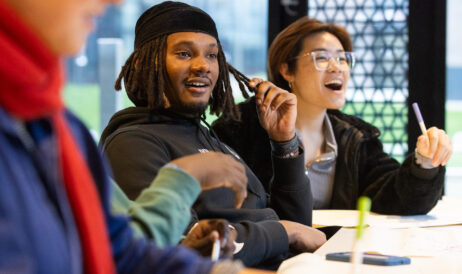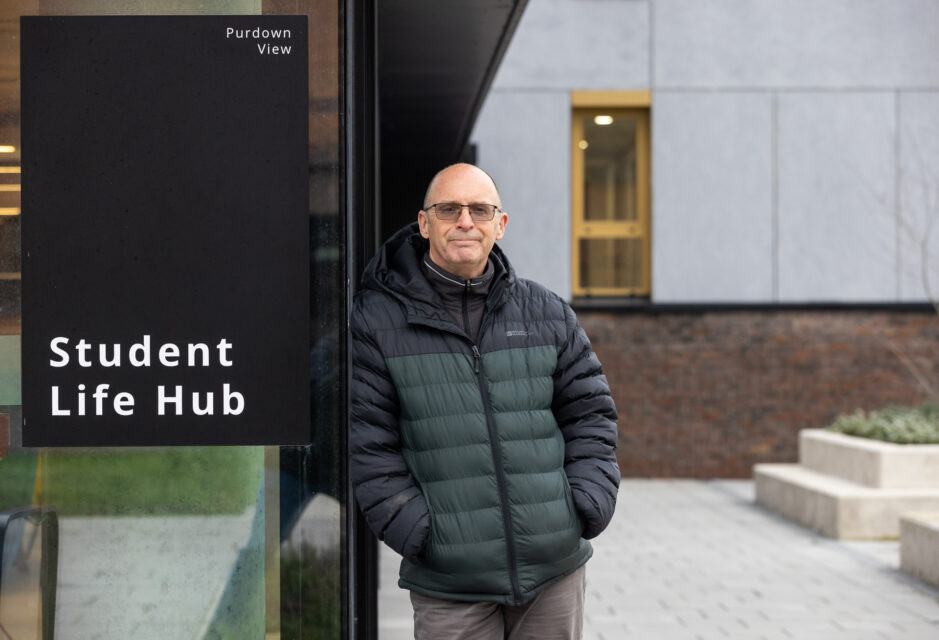
Andy, can you start by telling us what your role is?
I’m primarily an accommodation manager. When my daughter looked at UWE for university, I thought ‘This is such a nice place, I fancy working here’, so I joined back in 2013 on a six month contract to do the furniture provision and they’ve never let me go.
I have a military background—logistics planning and emergency first response—and because of that I’ve moved into project support and help out with project management.
That’s a big career change—what was that experience like for you?
It was really good because it’s the sort of thing I would do in the army. If we were going somewhere, I’d plan the move. You look at the whole picture. It’s not just about moving the soldier, it’s all the things that come with them—their families, kids’ schools, vehicles, weapons, the support for those.
Here it’s not just the provision of the building, it’s also what goes into the building. Where do we buy it from? How do we buy it sustainably? And I like to learn. I don’t want to be like, ‘We always did it this way’.
It sounds like you really feel a personal connection with Purdown because you were involved in the development?
I see it as my baby. I’ve been here since we started knocking Carroll Court down, and I’ve been here practically every day since. I’ve been in every single room; I’ve followed it all the way up onto the roofs. You know, my wife’s lived it, my daughter’s lived it. Along the way, I’d say, ‘Have you’ve seen this? We’ve got these carpet tiles. Oh, Izzie [Interior Designer] chose these colours.’ And my wife would say, ‘Oh yeah, I like that colour.’
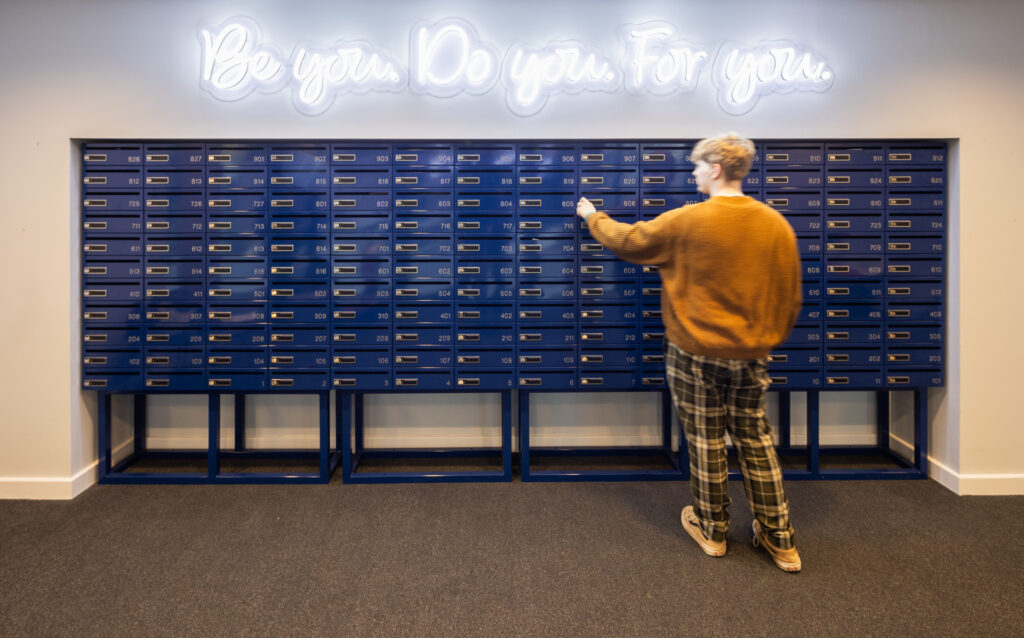
And are you happy with how the accommodation turned out?
I am, but there’s always things you can improve. We were always taught to do something, then write up your lessons learned, and how would you do it better.
Like those letterboxes you saw as you came in. They were originally going to be in each building. But we put them all there [points] because we’re going to build a café and I wanted the letterboxes directly opposite to increase footfall. That way the students meet each other and use the communal space.
We also worked with the students on the wording above it—“Be You. Do You. For You.” I did check it though because with Urban Dictionary you have to be careful. There was a big thing about ‘Netflix and Chill’ here, none of the staff realised what was being said for quite a while!
Which communal spaces have been most successful? Are they used as you’d imagined?
Students love that the laundry is in the lounge. In other places they’re standalone and often quite industrial, so you don’t want to sit in there. Here you get a lot of comments about, ‘We can play pool while our washing is on. Or we can watch TV.’
Small things like that, especially after COVID, have helped the students come out from their screens and interact in the real world.
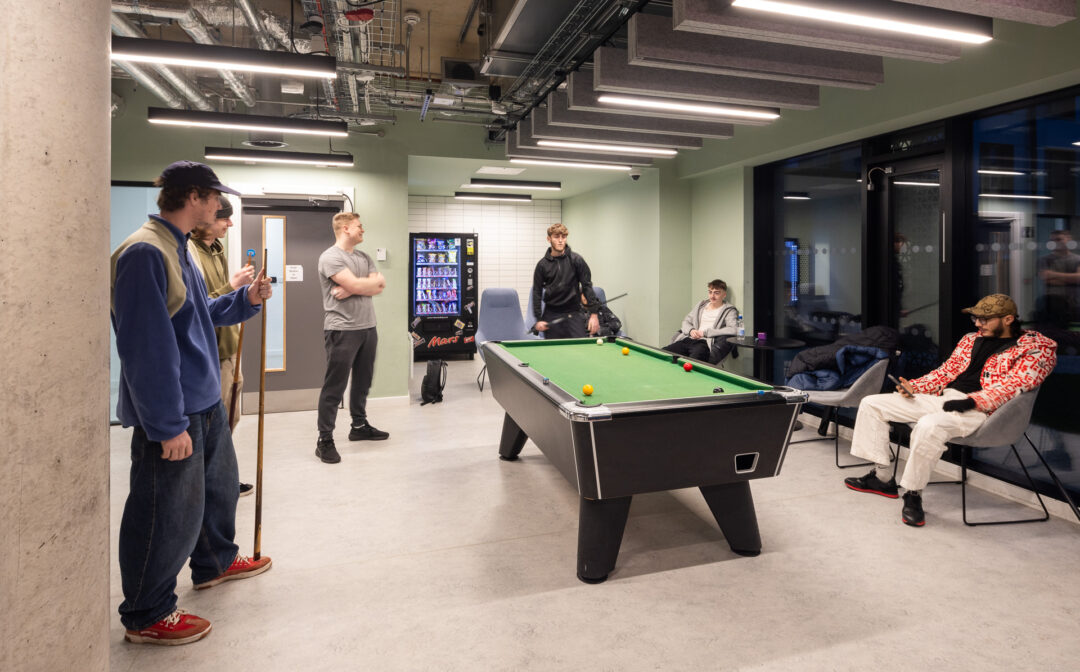
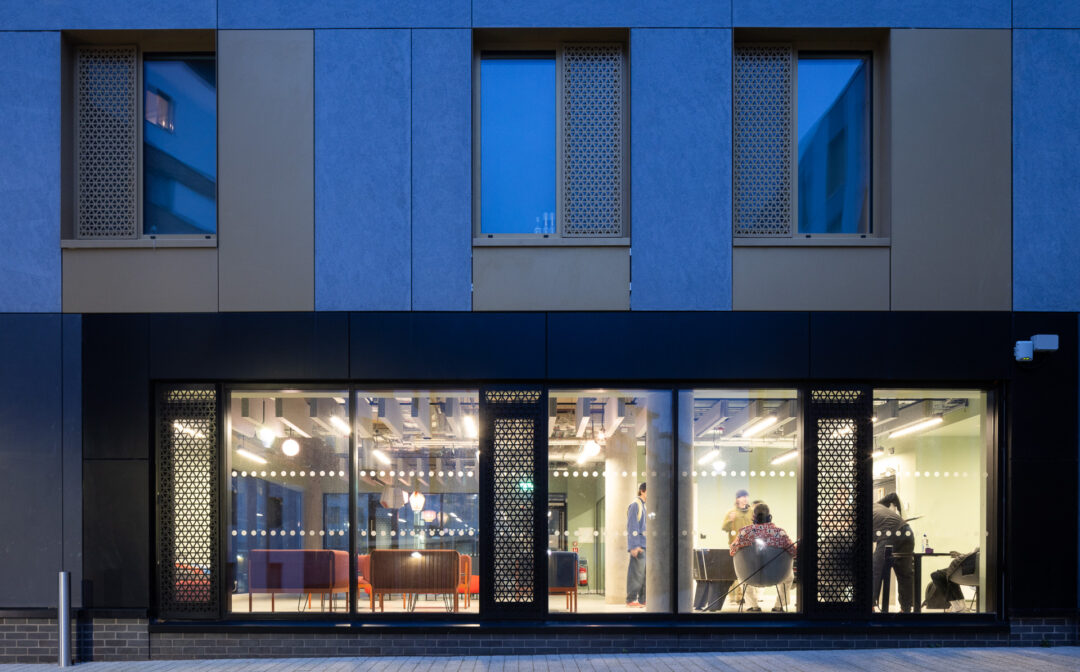
Can you share a bit more about that change in social interaction since COVID?
It’s been a big thing. When we went into lockdown, thousands of students couldn’t return home. Very quickly, they got used to being in their own little space and lost the ability to do this [interact]. Everything was through their keyboard. And people would say really hurtful things because they didn’t feel like they were in the real world.
Now they’ve gone through that, we’re having to re-teach them social interaction. So the university formed a team of second and third year students to run events and get people out of their rooms. And it works because it’s their peers. I’ve definitely seen a downturn in anti-social behaviour and malicious communication now they’re speaking to each other in person again.
Those are the Student Life Assistants?
Yes, they’re trained to know all the services we offer so they can push students to the right place. They also let us know, so we can also ask, ‘Hi, I understand you’re struggling a little bit. Is there anything I can do to help you?’ They get told things that people wouldn’t normally come forward and tell us.
It’s a really interesting model, having a distributed network of people on the ground.
I developed it a lot and went further because I also involve the cleaners. Nobody speaks to the cleaners, but they see an awful lot. They see people at their lowest. And so my cleaners will say, ‘You might want to go to see such-and-such. They seem quite low.’
Also the university has a policy of ‘don’t walk by’. So if ever you see anybody who’s struggling, everybody at the university is supposed to stop and say, ‘Hi. You alright?’ You’ll see that quite a lot, it’s a cultural thing.
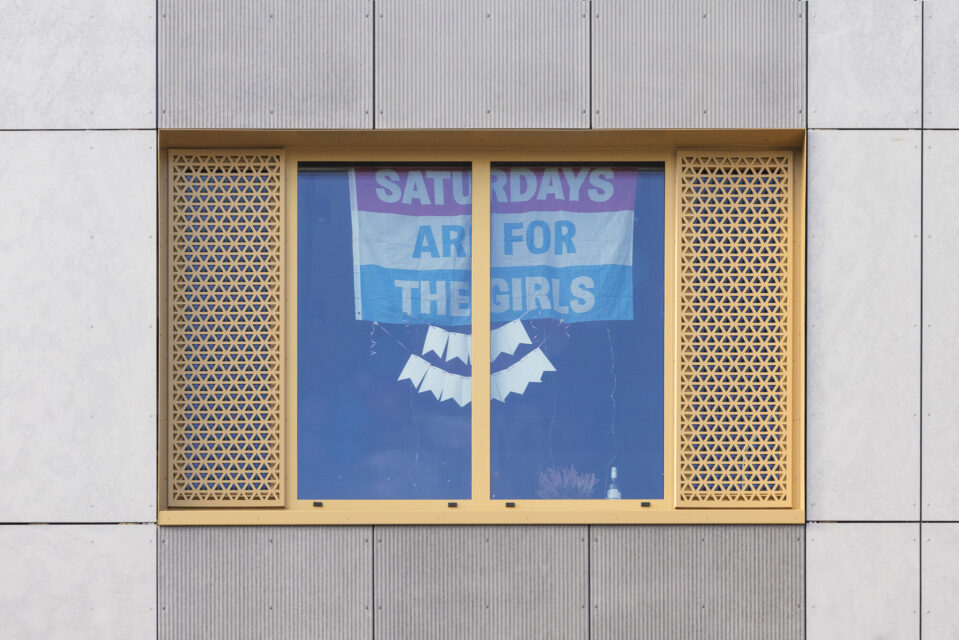
And do you see direct links between Purdown’s design and student wellbeing?
I think so. We definitely don’t have as many noise complaints. Insulation has worked massively. At the Student Village, there’s that constant, ‘boom, boom, boom’. You may have nursing students who work shifts at the hospital, and a Geography student that stays up all night playing loud music. Obviously that impacts people on shifts, or other students that might have a job to go to. So, you’re constantly dealing with the noise complaints over in the Village. But I haven’t seen anything here. And if you walk around the courtyard, it’s quiet.
It does feel peaceful today. Generally, how would you describe the quality of life for students at Purdown View?
Talking to the students, they find it more comfortable. We will receive a cohort of international students from Malaysia in January. It’s usually about 45 degrees when they take off, then they hit British winter.
The Prefect Heating system is so good that if you ring me up, ‘I’m struggling, it’s cold,’ I can just log into the heating system, look at your room and go, ‘Okay, she’s just come from Malaysia. I’ll put the international setting on,’ and your heating will go up straightaway.
You have an international setting that’s higher than a local setting?
Yes, we worked with Prefect on that. And again, coming back to the noise thing. I can pin down a noise complaint. It will show me in each individual property who is making noise.
Really? That must make your life a lot easier!
Yeah, you can see the sound waves. If you get really good at it, you can work out the snorers! [Laughter]. But yeah instead of sending an email to 10 students with a noise complaint, you can go straight to that person.
It’s great because medical students used to be on a separate campus, so their shift patterns wouldn’t be disrupted by all the noise. But it meant they didn’t get to use all the facilities on campus. Now, they’re here and get the same experience as all the other students, without having sleep deprivation or noise issues. That’s one of the big wins, that we’re able to give everybody an equal experience and quality of life.
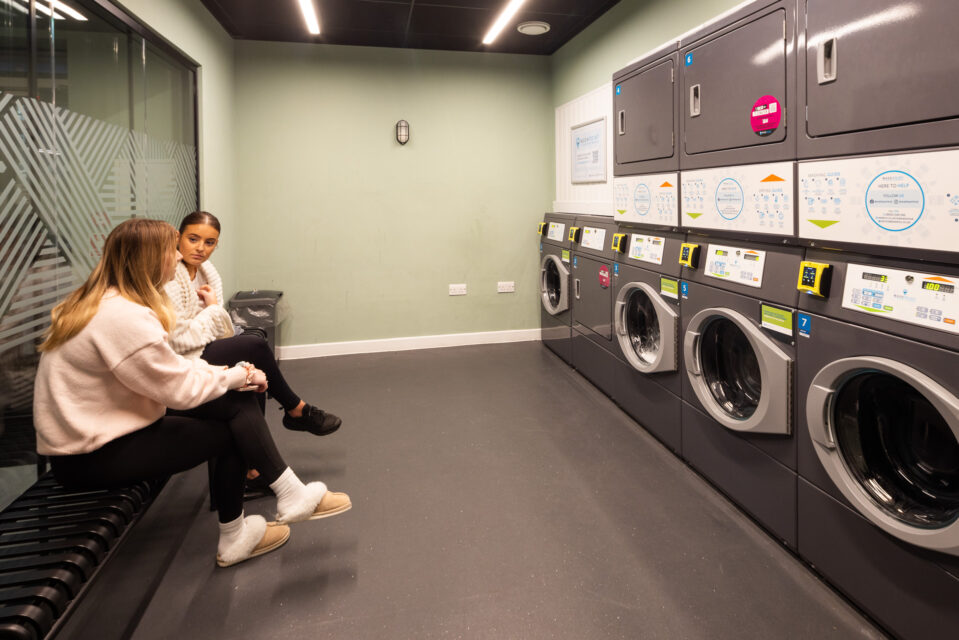
What life skills do you think students learn here before they transition into private accommodation?
Well a big thing for me is fire safety. As an Accommodation Manager at the Student Village, I looked after about 800 students. Each morning, we’d look at the previous night’s fire reports—analyse what’s going on, spot the trends. I’ve had a student set the fire alarm off because they put frozen pizza in the oven in the box!
Now on an open day we talk to the parents and say, ‘Can you teach them how to cook just a few dishes.’ That’s why we are passionate about it here, we’ll host events to help them create a meal.
Also, they don’t know how to do laundry. They come with nice white clothes and by October/November, they’re grey.
Ah yes, we spoke to a student who said people don’t know how to leave the machines tidy for the next person.
If you share washing machines with other people, it’s a good idea to check the seal! A few years back a girl came to be because her clothing was stained. ‘Well, you didn’t check the seal. People leave pens in’ and she was like, ‘Oh, yeah, I get all that.’ I said, ‘But also sometimes you might find money.’ [Laughter]
She cottoned on to that and would go around every washing machine in the university halls once a week. I bumped into her after a couple of months, she said, ‘Thank you ever so much. I’m making about £30-£40 a month.’
Smart move! So which design elements would you absolutely take in the next accomodation building? And what wouldn’t you do again?
There’s definitely some lessons about the gaming equipment. I did a workshop with fourth year architecture students to see what they wanted compared to what we had and I learnt that they feel certain games are gendered. So, for example, they said the pool tables were quite male-dominated. ‘Okay, what do you want instead?’ ‘Table hockey. Because boys and girls can play it.’ So that’s one of the things we will change.
Finally, what three words would you use to describe Purdown?
Exciting, fresh, and innovative.
Love that. People have been given such different answers.
We are all different, aren’t we? And that’s what we’ve got to remember!
